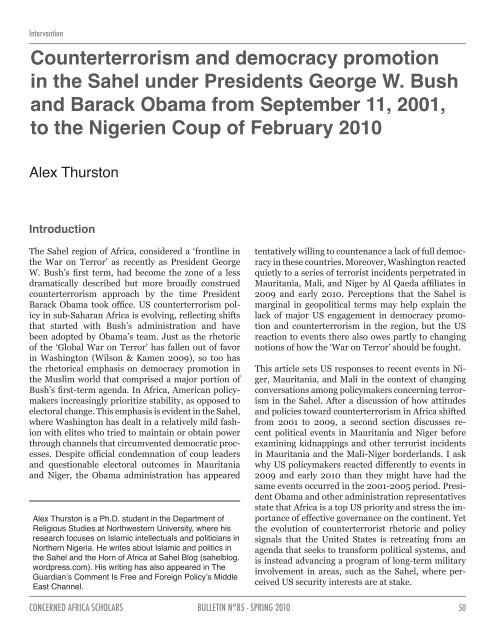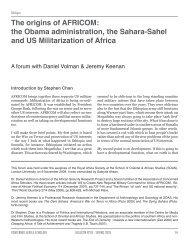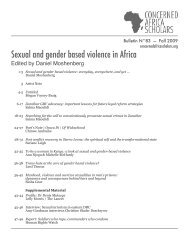Western Sahara and the United States' geographical imaginings
Western Sahara and the United States' geographical imaginings
Western Sahara and the United States' geographical imaginings
You also want an ePaper? Increase the reach of your titles
YUMPU automatically turns print PDFs into web optimized ePapers that Google loves.
Intervention<br />
Counterterrorism <strong>and</strong> democracy promotion<br />
in <strong>the</strong> Sahel under Presidents George W. Bush<br />
<strong>and</strong> Barack Obama from September 11, 2001,<br />
to <strong>the</strong> Nigerien Coup of February 2010<br />
Alex Thurston<br />
Introduction<br />
The Sahel region of Africa, considered a ‘frontline in<br />
<strong>the</strong> War on Terror’ as recently as President George<br />
W. Bush’s first term, had become <strong>the</strong> zone of a less<br />
dramatically described but more broadly construed<br />
counterterrorism approach by <strong>the</strong> time President<br />
Barack Obama took office. US counterterrorism policy<br />
in sub-<strong>Sahara</strong>n Africa is evolving, reflecting shifts<br />
that started with Bush’s administration <strong>and</strong> have<br />
been adopted by Obama’s team. Just as <strong>the</strong> rhetoric<br />
of <strong>the</strong> ‘Global War on Terror’ has fallen out of favor<br />
in Washington (Wilson & Kamen 2009), so too has<br />
<strong>the</strong> rhetorical emphasis on democracy promotion in<br />
<strong>the</strong> Muslim world that comprised a major portion of<br />
Bush’s first-term agenda. In Africa, American policymakers<br />
increasingly prioritize stability, as opposed to<br />
electoral change. This emphasis is evident in <strong>the</strong> Sahel,<br />
where Washington has dealt in a relatively mild fashion<br />
with elites who tried to maintain or obtain power<br />
through channels that circumvented democratic processes.<br />
Despite official condemnation of coup leaders<br />
<strong>and</strong> questionable electoral outcomes in Mauritania<br />
<strong>and</strong> Niger, <strong>the</strong> Obama administration has appeared<br />
Alex Thurston is a Ph.D. student in <strong>the</strong> Department of<br />
Religious Studies at Northwestern University, where his<br />
research focuses on Islamic intellectuals <strong>and</strong> politicians in<br />
Nor<strong>the</strong>rn Nigeria. He writes about Islamic <strong>and</strong> politics in<br />
<strong>the</strong> Sahel <strong>and</strong> <strong>the</strong> Horn of Africa at Sahel Blog (sahelblog.<br />
wordpress.com). His writing has also appeared in The<br />
Guardian’s Comment Is Free <strong>and</strong> Foreign Policy’s Middle<br />
East Channel.<br />
tentatively willing to countenance a lack of full democracy<br />
in <strong>the</strong>se countries. Moreover, Washington reacted<br />
quietly to a series of terrorist incidents perpetrated in<br />
Mauritania, Mali, <strong>and</strong> Niger by Al Qaeda affiliates in<br />
2009 <strong>and</strong> early 2010. Perceptions that <strong>the</strong> Sahel is<br />
marginal in geopolitical terms may help explain <strong>the</strong><br />
lack of major US engagement in democracy promotion<br />
<strong>and</strong> counterterrorism in <strong>the</strong> region, but <strong>the</strong> US<br />
reaction to events <strong>the</strong>re also owes partly to changing<br />
notions of how <strong>the</strong> ‘War on Terror’ should be fought.<br />
This article sets US responses to recent events in Niger,<br />
Mauritania, <strong>and</strong> Mali in <strong>the</strong> context of changing<br />
conversations among policymakers concerning terrorism<br />
in <strong>the</strong> Sahel. After a discussion of how attitudes<br />
<strong>and</strong> policies toward counterterrorism in Africa shifted<br />
from 2001 to 2009, a second section discusses recent<br />
political events in Mauritania <strong>and</strong> Niger before<br />
examining kidnappings <strong>and</strong> o<strong>the</strong>r terrorist incidents<br />
in Mauritania <strong>and</strong> <strong>the</strong> Mali-Niger borderl<strong>and</strong>s. I ask<br />
why US policymakers reacted differently to events in<br />
2009 <strong>and</strong> early 2010 than <strong>the</strong>y might have had <strong>the</strong><br />
same events occurred in <strong>the</strong> 2001-2005 period. President<br />
Obama <strong>and</strong> o<strong>the</strong>r administration representatives<br />
state that Africa is a top US priority <strong>and</strong> stress <strong>the</strong> importance<br />
of effective governance on <strong>the</strong> continent. Yet<br />
<strong>the</strong> evolution of counterterrorist rhetoric <strong>and</strong> policy<br />
signals that <strong>the</strong> <strong>United</strong> States is retreating from an<br />
agenda that seeks to transform political systems, <strong>and</strong><br />
is instead advancing a program of long-term military<br />
involvement in areas, such as <strong>the</strong> Sahel, where perceived<br />
US security interests are at stake.<br />
CONCERNED AFRICA SCHOLARS BULLETIN N°85 - SPRING 2010 50




